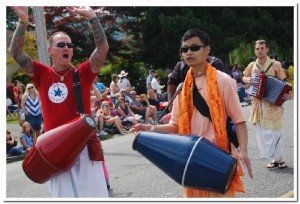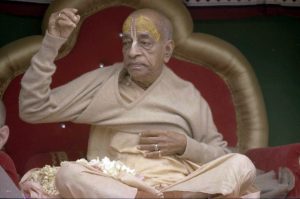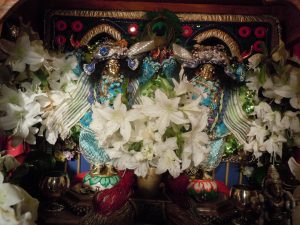![]()
By Ajit Krishna Dasa
This a a response to Dravida Prabhu’s article “The Book Changes – A Defense” (posted on the Sampradaya Sun (01.13.2014).
Basically Dravida Prabhu’s attempted defense boils down to two wellknown fallacious arguments often presented by the BBT International:
1. Prabhupada trusted Jayadvaita Swami pre Nov 14th 1978. Therefore the editing Jayadvaita Swami has done after Prabhupada’s disappearance (post Nov. 14th 1978) is also approved.
2. The books are made “closer to Prabhupada” by making them closer to the so called original manuscript (which is really only a draft).
Let us look at each of these fallacious arguments.
The “he is good” argument
I have posted an article on my blog defeating this fallacious argument so often presented by the BBT International:
BBT International and their supporters often attempt to justify the changes made to Prabhupada books by Jayadvaita Swami by pointing out that Prabhupada a couple if times spoke highly of his editing work.
This article will show that these statements by Prabhupada can’t be construed to mean that Jayadvaita Swami’s editing work after Prabhupada’s disappearance is pleasing to Prabhupada.
From BBT International’s website:
“Of course, regarding Jayadvaita Swami, the BBT’s chief editor, Srila Prabhupada wrote, “Concerning the editing of Jayadvaita Prabhu, whatever he does is approved by me. I have confidence in him.” (letter to Radhavallabha, 7 September 1976)
BBT International and their supporters often speak about this quote from Prabhupada as if it was some kind of blessing from Prabhupada that makes Jayadvaita Swami and his editing infallible even to this very day. This, of course, makes no sense and even Jayadvaita Swami himself admits that he sometimes commits mistakes in his editing. One example of this is his changing “Visnu Form” into the “Visnu platform” (Bg. 2.61)
So it’s obvious that we can’t take the statement “…whatever he does is approved by me” too literal. In order to be continuously approved by Prabhupada Jayadvaita Swami need to continuously meet certain criteria set forth by Prabhupada and sastra in regard to editing protocol. If it can be argued in any way that the editing policy of BBT International compromises the transcendental potency of Prabhupada’s books, or if Jayadvaita Swami becomes an atheist or a mayavadi or falls down and or if he somehow goes against the direct instructions of Prabhupada in his editing proces, then we must conclude that his editing is unauthorized and must be stopped. He can then no longer be “approved”.
This blog and several other websites have for years been showing that there is no evidence to support even the slightest change in Prabhupada’s books. It has been shown how Jayadvaita Swami does not at all perform his editing work according to the accepted protocol set forth by Prabhupada (“NO CHANGES”), sastra (arsa-prayoga) and even academic scholars. We have shown how he is actually sabotaging the books – however well-intentioned he may be.
So even though Prabhupada spoke highly of Jayadvaita Swami’s editing 40 years ago it does not make Jayadvaita Swami infallible, and it does not mean that he can just do whatever he likes to Prabhupada books.
The other quote that BBT International and their supporter often refer to is this:
From BBT International’s website:
“And in the conversation where Srila Prabhupada complained so strongly about “rascals editors,” Srila Prabhupada said about Jayadvaita, “He is good.””
So 40 years ago Prabhupada said about Jayadvaita Swami that he was “good”. Does it then follow logically or experientally that he is still “good”? Obviously not! There are several examples of Prabhupada at one point praising some of his disciple, and then at a later point criticized them severely.
Prahlada-Nrsimha Prabhu has written a very nice article about this (published on bookchanges.com):
“Just because Srila Prabhupada at one point said someone was a good man, does that mean that they are one now? Srila Prabhupada liked many devotees at one point and at that point put them in positions of power and authority and praised them, but later on down the road he changed his opinion about them and/or they went astray or deviated to one degree or another. So although at one point Prabhupada approved of someone and complimented them, that does not mean that from that point on they are bona-fide no matter what they do. Here are a few examples to further examine this point.
One Prabhupada disciple did HUGE service for Prabhupada, pushing on the book distribution mission (probably) more than any other Prabhupada disciple in ISKCON’s history, and was pretty much running ISKCON at one point. But later he changed the basic rules of the four regulative principles to three. Does that mean because he had so many thousands of disciples, and at one point was so dear to Srila Prabhupada that Prabhupada even commented on how he was so intelligent and empowered, that now we should all only have three regulative principles instead of four and continue to follow this devotee?
There were so many big, big devotees that Srila Prabhupada personally gave sannyasa to but later on Srila Prabhupada became so fed up with their deviations that he said that they should give up those positions as sannyasi! Srila Prabhupada even said “This should be strictly outlawed, no more sannyasis….there will be no sannyasi anymore.”
(Room Conversation — January 7, 1977, Bombay)
Srila Prabhupada established the GBC as the ultimate managing authority for all ISKCON. But at one point Srila Prabhupada totally disbanded the whole of the GBC within ISKCON due to their deviations! So simply because at one point in time Srila Prabhupada appointed them to power and trusted them, does that give them permanent power? No! At any time anyone can lose their position and power and deviate or go astray and at that point one is no longer authorized and empowered.
I feel the most relevant example is from the concluding words of the Sri Caitanya-caritamrta, dated November 10, 1974
“Now, by the grace of Sri Caitanya Mahaprabhu and his Divine Grace Bhaktisiddhanta Sarasvati Thakura, it is finished. In this connection I have to thank my American disciples, especially Sriman Pradyumna dasa Adhikari, Sriman Nitai dasa Adhikari, Sriman Jayadvaita dasa Brahmacari and many other boys and girls who are sincerely helping me in writing, editing and publishing all these literatures.”
But then on February 27, 1977 in Mayapura India Srila Prabhupada says “Nitai, he’s a rascal.”
Unfortunately there are so many examples I could mention, but in order to not depress/and embarrass all of us unnecessarily in this article I will stop here.
In conclusion, we have shown how the above two claims by the BBT International about Jayadvaita Swami being “good” and his work being “approved” by Prabhupada can’t be used to justify the changes he has made to Prabhupada’s books. And that they can’t be used as a guarantee that Jayadvaita Swami has not comitted mistakes himself or that he has pleased Prabhupada by his work.”
The “Closer to Prabhupada” argument
This particular argument in flawed in two ways. The first flaw is the rather weird idea that it is good to change a published book back to its earlier draft format without any consultation with the author. Madhudvisa Prabhu has written very nicely about this idea here:
“No author intends that the first draft of his book be published. He appoints an editor and together they work on the book to produce the manuscript which will ultimately be submitted to the publishers. In this case, Prabhupada wrote the first draft and then worked with Hayagriva and other editors to prepare the manuscript for hisBhagavad-gita As It Is, which was ultimately presented to Macmillan & Co. for printing.
Imagine you write the first draft of a book and appoint an editor. You work with your editor on a daily basis for months until together you produce a manuscript you are happy with and your book is published. Your book becomes a worldwide best seller and you are very happy with it. It is a spiritual book and by reading it many of the readers have life-changing experiences. They also become very attached to your book. Your book is praised by scholars worldwide with rave reviews. Then many years later, after you have left your body, somebody finds the first draft of your book and decides to “correct” your published book based on your first draft. Of course you were never intending to publish this first draft. That is why you spent so much time and energy working with your editor on that first draft to transform it into a manuscript you actually wanted to present to the publishers. How angry would you be with this fool who wants to undo your work and your editors’ work by going back to the first draft?
Jayadvaita Swami, by going back to the first draft, is eliminating so many corrections and so much work that Srila Prabhupada personally did on his book with Hayagriva and his other editors. This is a great disservice to Srila Prabhupada.” (Jayadvaita undoes Prabhupada’s work on Gita Manuscript, Madhudvisa Prabhu)
The fact is that bringing Prabhupada’s books closer to their draft is actually bringing them farther away from Prabhupada.
But the “Closer to Prabhupada” argument is flawed in an even worse way–it is false. It has survived and spread only because it is based on selective evidence. It is a fact that Jayadvaita Swami in some places has brought the finalized and definitive edition of Prabhupada’s Bhagavad-gita As It Is closer to its earlier draft form. On their websites, articles and seminars Jayadvaita Swami, Dravida Prabhu and the BBT International have presented these instances in great detail in an attempt to defend their work. But they have purposely left out all the many, many places where Jayadvaita Swami has made changes which are not traceable back to the earlier drafts.
On my blog I have presented many of these changes. Let us look at some examples:
There are about 127 changes made to the word-for-word translations of Prabhupada’s Chapter One in the Bhagavad-gita As It Is. The sanskrit translations were personally typewritten by Prabhupada. Only two of these changes were back to the original manuscript. Hayagriva Prabhu had stayed very loyal to Prabhupada’s so called original manuscript, but Jayadvaita Swami has made extensive corrections to Prabhupada’s own personally typewritten sanskrit translations. I have written about this in the article “Tampering with Prabhupada’s personally typewritten sanskrit translations“. This article also documents how Jayadvaita Swami is actually misrepresenting the facts about which kinds of changes he made in the editing process.
On my blog I have featured many examples on how Jayadvaita Swami has added new sentences, deleted Prabhupada’s own sentences and and re-arranged words and sentences in ways that are not traceable to the first drafts. They are not traceable to anything but Jayadvaita Swami’s own ideas. On top of that come the deleted foreword, artwork and front cover. How is that “Closer to Prabhupada”? I have written to both the BBT International and Jayadvaita Swami himself about these matters. But so far, after months of waiting, I have not received any answers to my queries.
Here are some of the articles containing questions to BBT International and Jayadvaita Swami:
The Duty of the Finger (Bg. 4.38)
Not back to the original manuscript (Bg. 13.3)
Removing “eternal” from the Bhagavad-gita As It Is (2.30)
Lord Ramacandra removed from the Bhagavad-gita As It is (10.31)
These are just a few. Here are more.
I sincerely hope that Dravida Prabhu will take the time to read this response and all the references given in it, and thereafter return with some clear answers to our questions and concerns.
![]()



